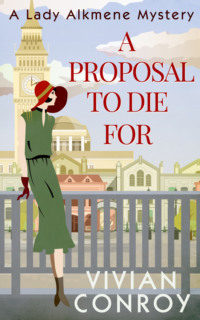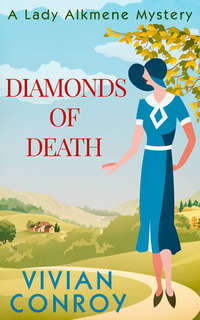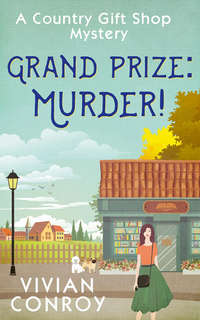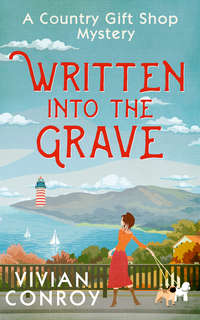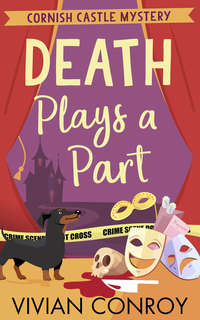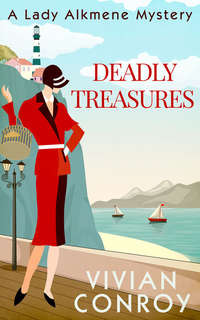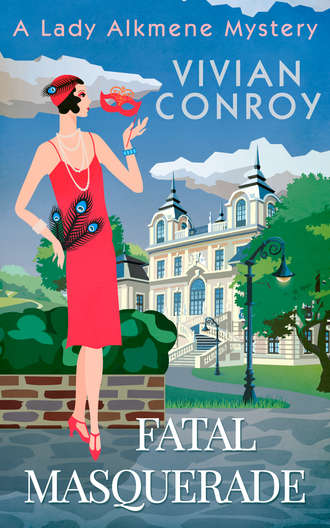
Полная версия
Fatal Masquerade
Alkmene shook her head. ‘I have a much better idea. You come over here. Come over here to me. Come on.’
The girl rose to her feet and came over, her eyes wide, her breathing shallow. She looked as if she was afraid of being slapped across the cheeks.
Alkmene said, ‘You were here putting out my clothes. I came into the room to fetch a present for my hostess. I pulled it out of the luggage so wildly the perfume bottle fell out and broke. I broke it. You understand?’
The girl gaped at her. ‘Why would you say that, my lady?’
‘Because I want to call someone up to clean away the glass and get the stain out of the carpet. You don’t know how to do it, and I certainly don’t. We need someone else in here, and as we’re not going to tell anyone it was you who broke the bottle, I’ll just have to say I did. Nobody is going to blame me for it. I can break all of my perfume bottles all over Mrs Hargrove’s precious rugs.’
Alkmene sounded a little more cheerful than she actually felt, as she suspected Mrs Hargrove would hate damage to any of her things and would blame her for it, even if she’d never say it to her face. And Denise might laugh at her that she was so clumsy, which would be awkward.
But anything was better than letting this poor girl run the risk of getting dismissed even before she had had a chance to prove herself able. Megan probably had a family somewhere depending on the money she brought in.
Alkmene said, ‘Are we agreed on this?’
‘I don’t understand.’ The girl’s eyes were huge and frightened. ‘Why would you lie for me?’
‘Because I’m in a much better position to deal with Mrs Hargrove’s wrath than you.’ Alkmene smiled widely. ‘Now, let me look you over. There’s no telltale stain of perfume that can betray you. No, that looks fine...’
She did see an odd reddish patch on the girl’s neck, under her left ear. It looked like a rash or something. Maybe she was allergic to perfume and had touched herself with her wet hands?
‘You go and take care of my clothes. I’ll ring now.’ Alkmene did, inwardly praising herself for her foresight in bringing a present for her hostess. It was an illustrated book on rose gardens. She pulled the parcel from her case just as there was a knock on the door.
‘Come in,’ Alkmene called, holding the parcel in front of her where it could be clearly seen.
A woman of around fifty in a simple dark-blue gown looked at her with a tight expression on her face. There were lines beside her mouth suggesting she usually disapproved of life.
Or was in some kind of pain perhaps? Alkmene remembered those facial lines from a friend of her father who suffered from gout.
The housekeeper looked even darker as she spotted the mess on the floor.
Alkmene waved a hand. ‘So clumsy of me. I was in a hurry to present Mrs Hargrove with this gift I bought for her in London. I knocked the bottle over and, of course, it just had to shatter into a thousand pieces. I have no idea what to do about such a stain, but I trust you know. Thank you, Mrs…?’
‘Carruthers, my lady.’ The woman bobbed and dutifully bent down over the stain. Her slow movements suggested a stiff back. So perhaps she did indeed live with constant pain.
As Alkmene had pretended she wanted to rush out to her hostess with the present, she should really have left right away. But it didn’t seem wise to leave Megan, in her upset state of mind, with Mrs Carruthers, who might ask more questions and see through the ruse.
Therefore Alkmene gestured at Megan to go on unpacking her luggage. She positioned herself at the open window, partially because the perfume scent was unbearable, partially because she had heard a car arriving and wanted to see who got out.
But the car didn’t halt in front of the house. It breezed past and disappeared around the corner of the stable building. Almost as if the new arrivals didn’t want to be seen by anybody in the house.
Alkmene tapped a finger to her lips. Interesting. There seemed to be quite a few mysterious things going on.
After a rather tense wait for Mrs Carruthers to finish with the stain without discovering the nervous Megan had anything to do with it, Alkmene was left alone to change for dinner with the house guests. The perfume scent had thinned on the fresh air let in by the open window, and the stain on the carpet was much less visible. Of course, it was still wet, and Alkmene realized she wouldn’t be able to ascertain how lasting the damage would be until it was all dry. Well, she had taken the blame, so there was nothing more to be done about it.
Humming to herself, she changed into her attire for the pre-ball dinner: a deep-green evening dress she had rarely worn before. It was important to remember who had seen you in what, so you could avoid walking around in the same thing too often. One might think the Callenders had fallen on hard times financially and that would never do.
Alkmene leaned over, close to the glass of her dressing table, to insert the thin silver hooks of her long diamond ear hangers. The light reflected in the facets, shimmering in prisms. She had brought other jewellery to wear with her red ball gown. A bit extravagant, but opulence was expected this evening.
In the corridor outside her room, Alkmene heard voices. She couldn’t make out the words but it seemed a woman was speaking reproachfully and a man grunted in reply.
Always curious, Alkmene made for the door quickly and opened it a crack to see, indeed, the backs of a woman and a man, making for the staircase. He had grey in his dark hair, and her blonde locks seemed dyed. It was typical. Turning grey was fashionable for men, making them look mature and worthwhile, while women had to hide every sign of ageing, lest their beauty be ruined.
Shaking her head, Alkmene straightened her dress and stepped into the corridor herself.
Just as she was at the head of the stairs, she heard the front door slam. A voice said, ‘You’re going to explain this to Lady Alkmene.’
She hurried down, calling, ‘Explain what to Lady Alkmene?’
At the front door two men stood. One of them, tall, broad, his hair still reddish-blond despite his age, was Mr Hargrove. And beside him, just as tall and broad in the shoulders, but dark and brooding as always, was the reporter and her partner in crime for several adventures, Jake Dubois.
‘What on earth are you doing here?’ Alkmene exclaimed.
Jake hitched a brow at Mr Hargrove. ‘I told you she wouldn’t like it.’
Alkmene wanted to say she did like it, but thought better of it. Jake had enough self-confidence already. He used to joke he always had to save her life. Of course, he had been rather useful on more than one occasion, but there was no need to confirm that to him.
Frowning at the pair of them, Alkmene said, ‘I had no idea you two knew each other.’
Mr Hargrove shrugged. ‘We bumped into each other at some social event and got to talking about aviation. Mr Dubois is going to write up a piece about my involvement in creating a new type of engine. I thought it only appropriate to invite him to our little party tonight.’
Alkmene hitched a brow. As Denise had aptly put it to her stepmother: ‘Papa loathes these parties.’ Why would Hargrove then invite someone to it, someone who didn’t move in the same social circles either? Hargrove might work on a new type of engine and enjoy a reporter’s interest in it, but he wouldn’t invite him into his family home, among his distinguished guests.
Hargrove walked away into the drawing room where he greeted his wife with a peck on the cheek. She gave him a critical once-over and straightened his tie, speaking to him in what appeared to be an urgent or reproachful manner.
Alkmene spied through the open door that the couple she had observed upstairs were also in there with her hostess. The man had a Mephistopheles beard that gave him a decidedly diabolical appearance. His wife had a cold, expressionless face, with remarkable light-green eyes.
Alkmene turned back to Jake Dubois before he could brush past her to greet Mrs Hargrove. ‘So, why are you really here?’
Jake feigned innocence. ‘Didn’t Hargrove just explain that?’
‘He might be grateful you’re going to extol his virtues as an aviation pioneer in the London papers, but not grateful enough to invite you to his manor, into his inner circle, for his wife’s celebrated masked ball.’
‘Hargrove isn’t old money. A man like him can see beyond old-fashioned class distinctions,’ Jake said softly.
Alkmene held his gaze. ‘I don’t pretend to know Hargrove at all. Like you say, he isn’t old money and I doubt he’s been raised in the way an aristocrat would have been. He’s also anything but old-fashioned, so he might even consider befriending journalists the new chic. He would show you off at his club maybe, or introduce you to friends at the races or the theatre. But why bring you home to his wife, who is far more class-conscious because she wants to move up in the world? In case you don’t know yet, Mrs Hargrove decides things around here. Why run the risk of antagonizing her on this happy night? So… what’s really the matter?’
Jake shook his head. ‘You’ve become oversuspicious, my lady, detecting mystery where there’s none.’
‘You’re here for a reason and, since we work together, you should tell me what it is.’
‘I don’t understand what you’re referring to,’ Jake said with a sweet smile. ‘Excuse me, I don’t want to keep my hostess waiting.’
And he walked into the drawing room where Hargrove was standing beside his wife, lighting a small cigar with a silver lighter. Mrs Hargrove hitched a brow at Jake and reached out a hesitant hand, glancing at her husband with an ‘I’ll get back to you about this later’ look.
Alkmene suppressed a grin and came in as well, making sure she was standing close enough to overhear how Hargrove introduced Jake. ‘Met at the club,’ Hargrove was saying, ‘and we got to talking about Eton.’
Jake blanched, and Alkmene stepped closer. ‘Eton?’ she asked with an innocent smile. ‘How interesting.’
Jake shot her a warning glance, but Mrs Hargrove was already distracted because the Mephistopheles bearded man had stepped forward, apparently waiting to be introduced. Not to Jake, but to Alkmene, as the straight stare of his intense blue eyes implied.
‘This is Theobald Zeilovsky,’ Mrs Hargrove purred. ‘A famous psychiatrist. He has written extensively on compulsive patterns of behaviour.’
‘Recurrent patterns of compulsive behaviour,’ Zeilovsky corrected her with a superior smile.
‘Yes,’ Mrs Hargrove said without flinching, ‘very interesting indeed. And Mrs Zeilovsky here is herself an expert in the field of, uh…’
‘Experimental psychology,’ Zeilovsky said. ‘She is a great help to me.’
‘I’m honoured,’ Mrs Hargrove said, ‘to receive both of them here for our masked ball. Now we must all have a drink before we go to dinner.’ She gestured at a man in black and white who had waited a few paces away with a tray full of tall glasses with a sparkly liquid in it. Alkmene recognized his smug expression at once. He was the man who had passed her in the corridor upstairs. The servant whose presence there had puzzled her. If he’d been hired to assist with serving at dinner and other kitchen-related chores, he had no business upstairs near the guest rooms.
He apparently noticed her attention as he held the tray out to her so she could pick up a glass. He winked.
Alkmene felt a sharp flush rise in her cheeks. It wasn’t the wink itself – for, despite Jake Dubois’ ideas about her, she wasn’t as class-conscious as others of her rank – but the complete confidence with which it was bestowed. Like he was winking at someone who should be happy he had acknowledged her. The superiority of it, even a strange sort of disdain, like he was mocking her, made her feel awkward.
He had already moved on, was serving drinks to the other guests pouring into the room: a middle-aged lady with her husband and, right behind them, Denise. Her mood seemed to have improved again and she came for Alkmene at once. Gesturing at the middle-aged lady, she said, ‘That’s my Aunt Felicia. I must have mentioned her before.’
Alkmene nodded. Felicia was the only sister of Denise’s deceased mother. Denise had mentioned the two had always looked alike, so that when they were children, they had been mistaken for twins. Right now, as she surveyed Felicia, she wondered if there was still a strong likeness with the late Mrs Hargrove. If so, it had to be awkward for both Hargrove and his new wife to have her around.
But apparently Felicia was still a part of the family circle, invited here to spend the highlight of the season with them.
Holding her glass, Alkmene moved over smoothly and smiled. ‘So nice to meet you. And your husband.’
At that moment another man came in, a bored expression on his handsome face. He ignored the servant who offered him a drink and went straight for the window, folding his hands at his back and staring out as though he was immensely bored with the proceedings.
Denise whispered in Alkmene’s ear. ‘I wish Cecily hadn’t invited him. Keegan is so tiresome. Simply refuses to be sociable. He made this trip lately, to the lake of Lugano, but he won’t tell a thing about it. I bet he considers it too frivolous. His mind is always on some legal thing, you know. Always contemplating some new change to the law he wants to get through parliament. Can’t talk about plays or operas or the latest work in the galleries.’
Alkmene studied the brooding figure, concluding it had probably been him who had watched her arrival from the library window. His tight back screamed that he wanted to be left alone.
‘If he’s not exactly sociable,’ she said to Denise, ‘I wonder why he came here in the first place. He could have made up some excuse to decline your stepmother’s invitation.’
Denise smiled. ‘He’s still in love with me.’
She met Alkmene’s startled look with a grin. ‘Oh yes, he asked Papa if he could court me. I think he felt he should ask because his firm works for my father and it would be awkward if we’d stepped out together and Papa had not approved. Indeed, he did not. Papa had the same idea about it as I do. Keegan is the last person in the world I could ever like, let alone love. But he sticks to this foolish notion that we’re meant to be together. He’s here to pine for me from a distance.’
‘I doubt,’ Alkmene said, ‘that someone with the dry legal mind you just described to me would spend one moment on such romantic notions of unrequited love.’
Denise’s eyes sparked. ‘You probably think he will like you, because you’re so smart and can discuss the law with him on his own level. But let me assure you, he still cares for me and won’t even dance with you once. I will make sure he doesn’t.’
Alkmene shrank under the spiteful tone. She knew Denise could flare in an instant when she felt denied or snubbed. She wanted to clarify that she didn’t have any interest in discussing the law with the taciturn lawyer or indeed in dancing with him tonight, but before she could do so, a shadow fell over them.
It was the psychiatrist with the diabolical beard.
He studied them with a knowing smile. ‘Ah, girls who are close friends, the inevitable and eternal struggle, first for the affection of the mother, then for the attention of men. It often leads to complexes. To very deep, twisted emotions that can lead to… irreparable damage.’
Irreparable damage to the night of masked fun, Alkmene wondered, if she stepped on Denise’s petite foot to get even with her for these spiteful remarks? What did Zeilovsky expect them to do? They were not four any longer, and retaliation had no place in polite social discourse. Alkmene smiled at Zeilovsky. ‘An interesting theory.’
Zeilovsky’s blue eyes lit. ‘I can tell you much more about it over dinner. It seems our hostess decided I’m to be seated beside you.’
Alkmene kept a tight rein on her facial expression. ‘Really? How thoughtful of her. She knows how I enjoy psychology.’ She doubted Mrs Hargrove did know as much, but she had to say something to explain her hostess’s decision. Perhaps Mrs Hargrove had simply wanted to make sure Zeilovsky wouldn’t be engaging her with talk of twisted theories and dark experiments?
He reminded her of her father’s many friends from the fields of zoology and botany who could spend hours expounding on their favourite topics, be it rabies or mould, to the despair of their hostesses, who saw their dinner parties invariably ruined.
Alkmene wondered if Zeilovsky would be a man of theory only, or also of practice, having a clinic abroad where he tested his solutions for mental disturbances on his unsuspecting patients. His accent sounded Slavic, which covered quite a lot of ground for him to hide away a country house full of test subjects. The idea of experiments with adults who were considered insane wasn’t very palatable, but it might be even worse if those recent publications that described experiments with children – babies even – were to be believed.
The idea of a dungeon far away, where Zeilovsky was free to test whatever weird theory he had developed, and on babies, too, gave Alkmene goosebumps.
But perhaps she was getting carried away by rumours she’d heard about the darker side of the growing insight into the workings of the human mind. Zeilovsky might be a man who hid in his study digging through books and writing up his own theories from thought experiments, never having seen a single patient up close.
‘Shall we?’ With a smile, Zeilovsky offered Alkmene his arm to lead her into the dining room, explaining how sibling strife went all the way back to Cain and Abel. Alkmene was aware of Jake Dubois’ expression. He looked innocent enough, but knowing him well she could guess how hard he was laughing inside.
The masked ball she had been looking forward to as a night of innocent amusement was rapidly declining into a social nightmare.
Chapter Three
‘A tragic case,’ Zeilovsky said.
He had engaged Alkmene all during dinner with his talk of warring siblings, going from biblical examples, via English history, to the present-day case of Vera Steeplechase, who had murdered her sister, Mary, so as to be able to marry her brother-in-law, the man she had wanted for herself from their first meeting ten years earlier. Vera had almost got away with it as Mary’s death had been deemed natural at first.
Only two days before Vera’s wedding to the widower, an anonymous letter to the police had caused Mary’s body to be dug up, and a postmortem had shown traces of poison. Instead of going down the aisle in her sumptuous bridal gown – purchased in the presence of her unsuspecting mother, who’d had no idea her one daughter had killed the other – Vera had been taken into custody, to be tried and perhaps eventually hanged.
‘I do wonder,’ Alkmene said, putting her fork down, ‘who wrote the anonymous letter.’
Opposite her, Aunt Felicia knocked over her glass of wine. There was little liquid left in it, and her husband could quickly dab at the stain with a napkin. The woman’s face was on fire as she glanced down into her lap.
Alkmene continued to Zeilovsky. ‘Was it just a spiteful person who wanted to ruin Vera’s wedding, her day of happiness, and who got more than he or she bargained for? I find it hard to accept the writer knew for sure Vera had poisoned her sister. If he or she had known, they should have shared that knowledge with the police at the time of Mary’s death.’
‘Perhaps the person wasn’t sure at the time,’ Mrs Zeilovsky said, speaking past her husband. ‘Perhaps he or she had seen Vera near some bottle with a potion Mary took on occasion to calm her stomach or her nerves. Perhaps only later, when Vera announced she was going to marry her brother-in-law, did that person realize she might have tampered with the contents of the bottle in question to kill her sister and take Mary’s husband for her own. The human mind doesn’t always jump to conclusions straight away. Sometimes we lack information that can make us see the connection.’
Alkmene nodded slowly. That did make sense.
‘In Vera Steeplechase’s case the information that was first lacking was the motive.’ Zeilovsky picked up his wife’s reasoning as if the couple had agreed on it beforehand. ‘The person who saw her near Mary’s bottles before Mary’s untimely death would never have guessed Vera wanted to kill her own sister. It would be such a heinous thing to do. You don’t expect it of siblings.’
‘No? But you’ve just regaled me with stories of countless murderous siblings,’ Alkmene said with an innocent smile.
Ignoring the flaw in his reasoning, Zeilovsky went on, ‘The mind can even refuse to make a connection because it doesn’t want to. The writer of the anonymous letter might have cared very much for Vera and initially have refused to conclude she was guilty of something as terrible as murder. Only after time had gone by, and Vera’s true intentions revealed themselves in the announcement of the marriage to her brother-in-law, did the person dare write the letter.’
Alkmene leaned back. ‘We won’t know if Vera is really guilty of poisoning Mary until it’s been proven in her trial.’
‘My dear lady,’ Zeilovsky said, ‘Mary’s body was full of poison.’
‘So, we know for certain that Mary didn’t die a natural death. That doesn’t prove her sister Vera killed her.’
‘But Vera agreed to marry Mary’s husband!’ Mrs Zeilovsky cried. ‘So soon after poor Mary was dead.’
‘Perhaps the husband saw, too late, after he had already married Mary, that he wanted Vera anyway. Perhaps he killed Mary, thinking nobody would suspect anything. Now Vera’s been accused, he’ll keep his mouth shut and she might swing for his crime.’
Alkmene realized too late she had spoken quite clearly and other conversations around the table had just come to an end. The words ‘swing for his crime’ seemed to ring out in the sudden silence.
Mrs Hargrove gave her an accusing look from the head of the table. ‘Dear Alkmene, must you be so gruesome over dinner?’
‘On the contrary,’ the dry legal man said. He hadn’t spoken much with anybody, leaning over his plate and wolfing down his food like he never got anything good at home.
But now he sat up straight, fixing her with burning eyes. ‘I think Lady Alkmene has made an excellent point. All we do know is that a woman who died was poisoned and that, some time later, her sister wanted to marry the widower. Does that make her a killer?’
The silence around the table lingered, a little startled and a little chill.
Keegan continued, ‘It certainly makes her a suspect. But, as Lady Alkmene just explained, the husband himself springs to mind as a likely suspect.’
‘Poison is a woman’s means,’ Aunt Felicia’s husband said. He was a handsome man with a deep baritone voice. Alkmene couldn’t remember his name.
Jake laughed softly. ‘A man who wants to kill his wife and get away with it will hardly dig a steak knife into her chest.’
‘Please!’ Mrs Hargrove exclaimed, but Hargrove said, ‘Well put. He would know better than to use a weapon that leaves clear traces. We all know now how clever the choice of poison really was. Without the anonymous letter, nothing would ever have come of it. No case, no conviction.’
Alkmene looked at Aunt Felicia, whose expression had lost the earlier deep red and was now unnaturally pale, as if made of marble. She bit her lip for a moment as she stared down at her plate. The subject seemed to be unbearably painful to her. Had she known the Steeplechase family? Did Vera’s upcoming trial fill her with dread of a possible conviction?
‘Yes,’ Jake Dubois said, looking around the table, ‘there always has to be someone writing an anonymous letter, right? Spoiling it all.’
Mrs Hargrove pushed her chair back in a grate. ‘Gentlemen, I’m sure you want to smoke. Ladies, please accompany me to the music room where Denise will play and sing for us.’
Denise looked astonished. She gestured at the plate in front of her. ‘But dessert hasn’t even been served.’


